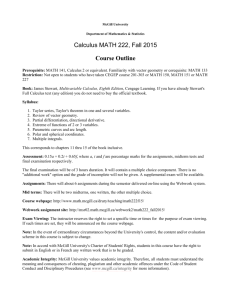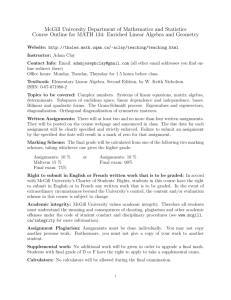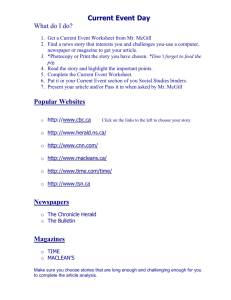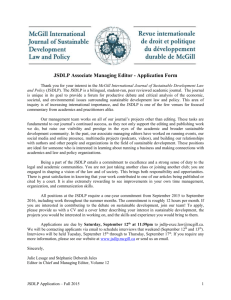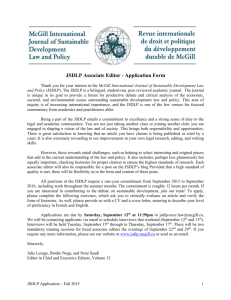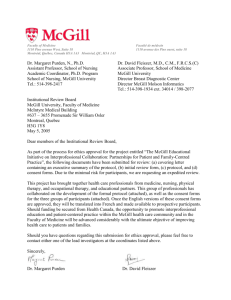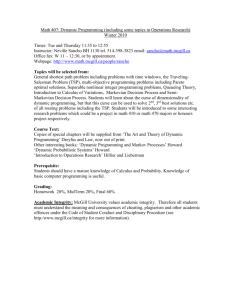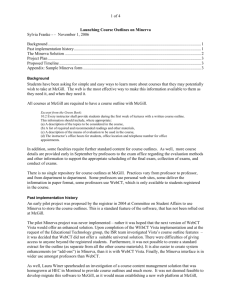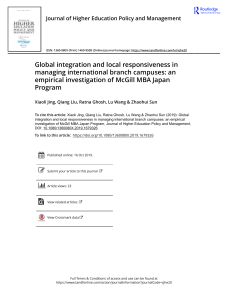Desautels Faculty of Management Management Research Statistics
advertisement
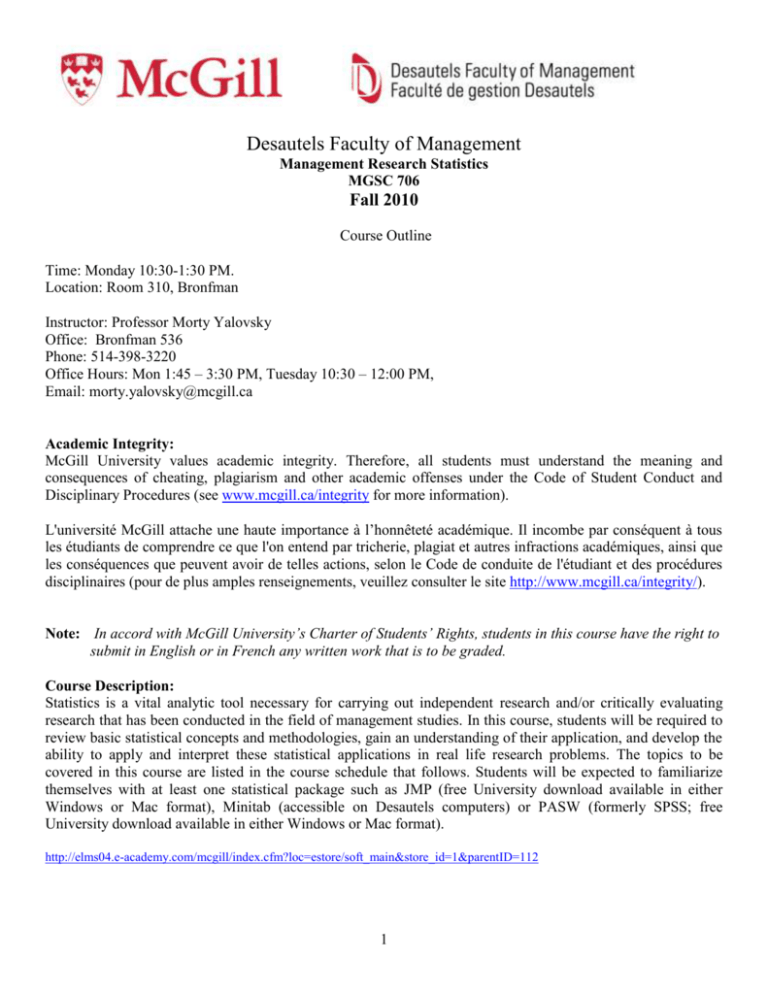
Desautels Faculty of Management Management Research Statistics MGSC 706 Fall 2010 Course Outline Time: Monday 10:30-1:30 PM. Location: Room 310, Bronfman Instructor: Professor Morty Yalovsky Office: Bronfman 536 Phone: 514-398-3220 Office Hours: Mon 1:45 – 3:30 PM, Tuesday 10:30 – 12:00 PM, Email: morty.yalovsky@mcgill.ca Academic Integrity: McGill University values academic integrity. Therefore, all students must understand the meaning and consequences of cheating, plagiarism and other academic offenses under the Code of Student Conduct and Disciplinary Procedures (see www.mcgill.ca/integrity for more information). L'université McGill attache une haute importance à l’honnêteté académique. Il incombe par conséquent à tous les étudiants de comprendre ce que l'on entend par tricherie, plagiat et autres infractions académiques, ainsi que les conséquences que peuvent avoir de telles actions, selon le Code de conduite de l'étudiant et des procédures disciplinaires (pour de plus amples renseignements, veuillez consulter le site http://www.mcgill.ca/integrity/). Note: In accord with McGill University’s Charter of Students’ Rights, students in this course have the right to submit in English or in French any written work that is to be graded. Course Description: Statistics is a vital analytic tool necessary for carrying out independent research and/or critically evaluating research that has been conducted in the field of management studies. In this course, students will be required to review basic statistical concepts and methodologies, gain an understanding of their application, and develop the ability to apply and interpret these statistical applications in real life research problems. The topics to be covered in this course are listed in the course schedule that follows. Students will be expected to familiarize themselves with at least one statistical package such as JMP (free University download available in either Windows or Mac format), Minitab (accessible on Desautels computers) or PASW (formerly SPSS; free University download available in either Windows or Mac format). http://elms04.e-academy.com/mcgill/index.cfm?loc=estore/soft_main&store_id=1&parentID=112 1 While Excel can be used to carry out many types of Statistical Analyses, it may be limited when dealing with research situations. In keeping with past practice for this course, students are expected to review the subject matter and learn new material mainly through self study; the instructor will provide a summary of topics covered and will highlight situations that researchers may encounter in their work. Course Prerequisite: A solid background in college level mathematics is required. Those who have studied Statistics in their University programs will benefit from the review of statistical concepts and the introduction of new approaches that will be covered in this course. Those for whom statistical concepts and methodology are new will find the course to be challenging, yet doable. Course Text: Statistics and Data Analysis: from Elementary to Intermediate, 2000 by Ajit C. Tamhane and Dorothy D. Dunlop, published by Prentice Hall. New and used books are available online via Amazon.ca and Chapters.ca: http://www.amazon.ca/s/ref=nb_ss_gw?url=search-alias%3Daps&fieldkeywords=statistics+and+data+analysis+from+elementary+to+intermediate&x=0&y=0 http://www.chapters.indigo.ca/books/search?keywords=statistics%20and%20data%20analysis%20from%20eleme ntary%20to%20intermediate&pageSize=10 Grading: The course requirements will include homework assignments, class tests and a final examination. The mark allocation will be as follows. Homework assignments Class Test Final Examination 15% 15% - October 25th, 2010 70% - December 13th, 2010 A grade of at least 65% will be required to pass the course. Marks for the course will be submitted on a Pass/Fail basis 2 Course Schedule: Week Date Topic Text 1 Sept. 13,15 Introduction; Data representation, summarization and interpretation Chapter 1, 4.1 - 4.4 2 Sept. 20 Basic Probability concepts; probability distributions 2.1 - 2.9 3 Sept. 27 Population; Sampling; Statistics and their sampling distributions 3.1 - 3.3, 5.1 - 5.4 4 Oct. 4 Basic concepts of Inference; Estimation and hypothesis testing 6.1 - 6.4 5 Oct. 18 Hypothesis testing; Inference on two samples 7.1 - 7.3 6 Oct. 25 Class Test 8.1 - 8.5, 9.1 - 9.2 7 Nov 1 Inference continued, Chi Squared Tests; Non-parametric methods 9.1 - 9.5, 14.1 - 14.3 8 Nov. 8 Simple Regression and Correlation 10.1 - 10.4, 10.6 9 Nov. 15 Regression continued, Multiple Regression 11.1 - 11.3 10 Nov. 22 Multiple Regression; Indicator variables 11.4 - 11.9 11 Nov 29 ANOVA; Simple and Multifactor Designs 12.1 - 12.2 12 Dec. 6 Time Series Analysis; Forecasting Methods 4.5 13 TBD 14 Dec. 13 Random variables; Common Review Room 310 Final Exam 3 Code of Professional Conduct in the Classroom Desautels Faculty of Management McGill University In preparing our students for careers in business, government, and non-profit organizations, it is essential that we strive for the highest levels of professionalism. Central to that objective is the development of a respectful and professional atmosphere in and around the classroom. It is expected that both students and professors will treat each other as well as visitors to the Faculty with respect and consideration. In order to foster such an environment, the following is expected of all parties: Communal Responsibilities: Classroom Preparation: Students and professors must come to class prepared for that day’s topic and ready to engage themselves. Timeliness: Both students and professors should arrive before the official start of class, such that the professor then begins class on time. It is the responsibility of the professor to then end class on time, thus not causing students to be late for their next class. Food: Individuals should be discreet in the bringing of food into the classroom, and it is the responsibility of each person to properly dispose of any waste they may create so as not to detract from the development of a professional atmosphere. Student Responsibilities: Electronics: Electronics should only be used in support of the classroom experience. Towards this end, the following policies hold: Cell phones/blackberries should be turned completely “Off” (Using the “Silent” mode is not sufficient). At no time should someone during the course of the class engage in making/receiving phone calls, sending/receiving SMS’s/emails, using cameras, or surfing the internet with such devices. The use of computers is at the discretion of the professor, and should be made clear by him/her. If they are allowed, they should only be used to support that day’s material (i.e., taking notes, using the web as directed by the professor). Checking email, surfing the web for non-class related topics, chatting on the net, or working on other projects are not acceptable forms of behavior. All other forms of electronics (i-pods, MP3 players, PDAs, etc), should also be maintained in the “Off” position. Newspapers/Other Material: No one should be reading newspapers or other material not related to that day’s class. Leaving Class: Students should not be walking in and out of class to attend to other matters. Professor Responsibilities: Class Cancellation: If a professor cancels a class, he/she must reschedule it with proper notice to all students. The Area Coordinator and Associate Dean Academic should be notified of such cancellations. Returning Assignments: Assuming their assignments are turned in on time, students are entitled to have their coursework returned within a reasonable amount of time and be provided with appropriate feedback. Final Grade Submission: Professors are required to submit final grades in accordance with universitydesignated deadlines. 4
